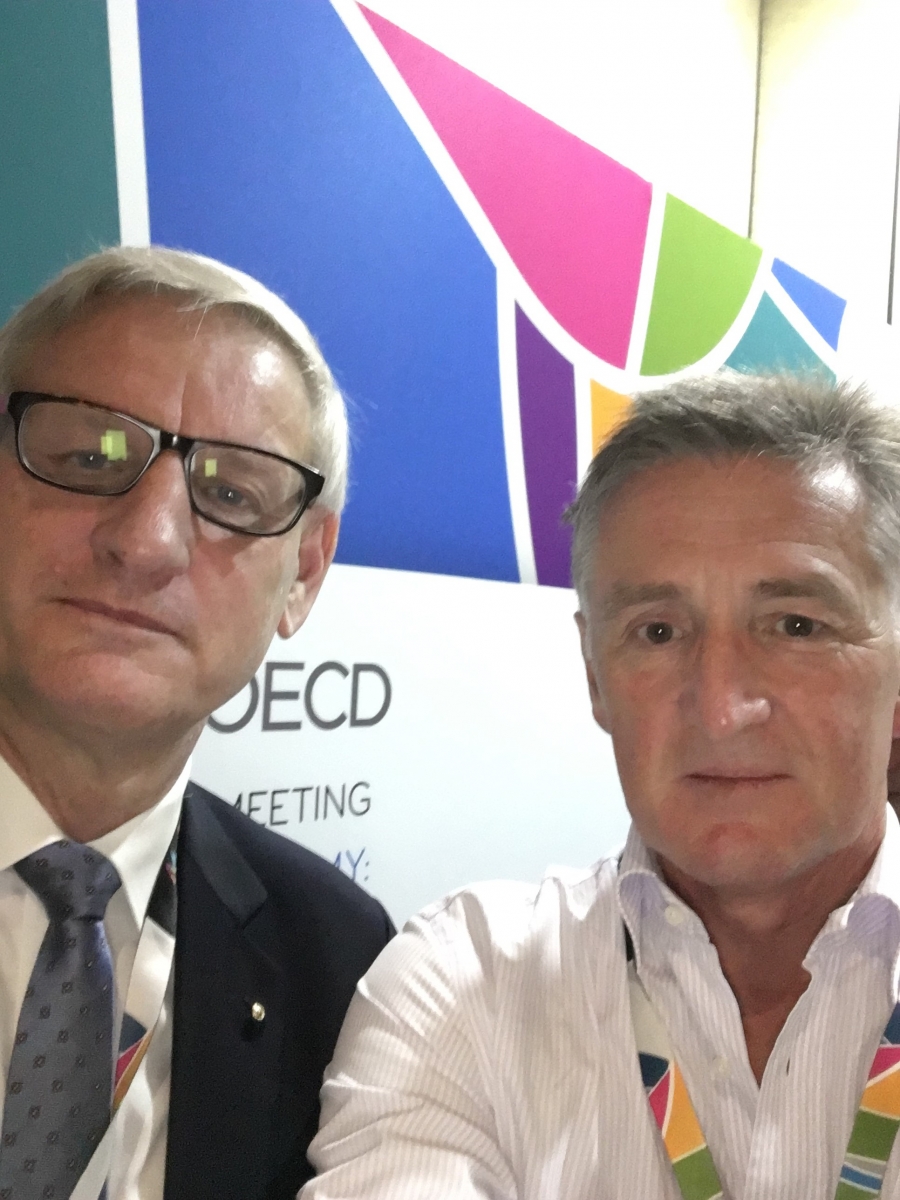Global Commission on Internet Governance report calls for a new social compact for the new digital society


The Chair of the Global Commission on Internet Governance (GCIG) & former Swedish Prime Minister, Carl Bildt, discussed the digital economy with UNI Global Union General Secretary, Philip Jennings and other members of the TUAC led global union delegation at the OECD Ministerial Meeting on the Digital Economy in Mexico
The Global Commission on Internet Governance says the future of the internet is at risk in a report released at the OECD Ministerial Meeting on the Digital Economy in Cancun, Mexico this week.
The report entitled “One Internet” calls for a new social compact for the digital economy, mirroring the resolution adopted by UNI Global Union at its World Congress in Cape Town on the “Future World of Work”. The report said, “The (CGIG) Commission envisions a world in which the Internet reaches its full economic and social potential, where fundamental human rights such as privacy and freedom of expression are protected online. This optimistic future can only be achieved if there is universal agreement to collectively develop a new social compact ensuring that the Internet continues on track to become more accessible, inclusive, secure and trustworthy.”
The report confirmed the views of the labour delegation who took an active part in the discussions at the OECD meeting. The delegation pointed out that though there were many positives to be found in the growing digital economy, there were many traps to be avoided including the risks attached to the fragmentation of work and outsourcing. The current abuse of many platform workers earning low pay for long hours, precarious work with no social benefits were some of the one examples.
UNI Global Union General Secretary Philip Jennings who addressed the summit said, “There are many positives to be wrung from the digital revolution but it must steer clear from a new race to the bottom. We see digi-capitalists behaving inconsistently with the OECD Guidelines on Responsible Business Conduct and the growth of surveillance capitalism. It’s no consequence that the number one concern for participants here at the summit is trust in the digital economy. We are on the way to the future world of work and we must collectively make the right decisions.”
Participants agreed that the issue of trust was central to the future of the new digital society, a point also made strongly in the GCIG report: “There is a need to reverse the erosion of trust in the Internet brought about by indiscriminate and nontransparent private practices such as the collection, integration and analysis of vast amounts of private information about individuals, companies and organizations. Private surveillance based on “big data” is often conducted under the guise of a free service.
“Interception of communications, collection, analysis and use of data over the Internet by law enforcement and government intelligence agencies should be for purposes that are openly specified in advance, authorized by law (including international human rights law) and consistent with the principles of necessity and proportionality. Purposes such as gaining political advantage or exercising repression are not legitimate,” the report said.
“The Internet is at a crossroads. The threats to privacy and the risk that the Internet will break apart are real,” said Bildt.
“A healthy Internet is one where data and information flow freely, where barriers to Internet access are eliminated, where personal and commercially-sensitive data are protected, and the technical infrastructure that makes it all possible is stable. Achieving this, however, will only happen if governments, business and civil society commit to working towards a new model of Internet governance,” Bildt concluded.
The report outlines three possible scenarios for the future of the internet:
Worst case scenario: Internet breaks down due to cybercrime and government regulation. “The cost of cybercrime in 2016 may be as high as $445 billion and that figure could grow as high as two trillion dollars a year in 2019 and continue to increase to as much as three trillion dollars annually by 2020. In this worst-case scenario, newly connected users become easy targets for commercial exploitation, fraud and cybercrime.”
Middle scenario: unequal and uneven gains. “Stunted growth, where some users capture a disproportionate share of “digital dividends” while others are permanently locked out.”
Best case scenario: broad and unprecedented progress. “A healthy Internet produces unprecedented opportunities for social justice, human rights, access to information and knowledge, growth, development and innovation. Some estimates put the economic contribution of the Internet as high as $4.2 trillion in 2016. The Internet of Things (IoT) could result in upwards of $11.1 trillion in economic growth and efficiency gains by 2025.”
UNI Global Union will hold a leadership summit on the Future World of Work in November.

